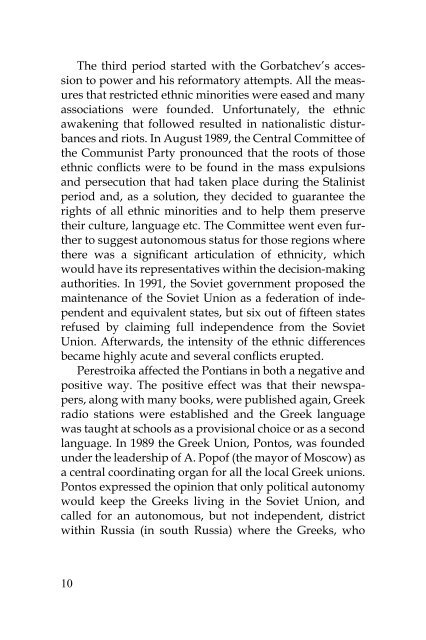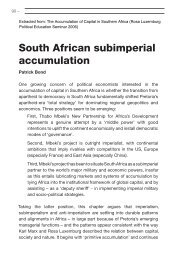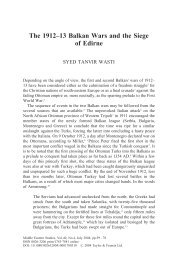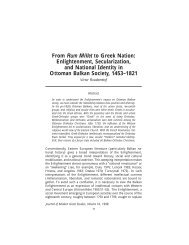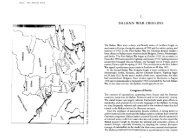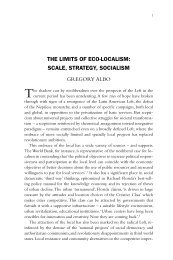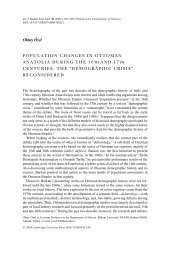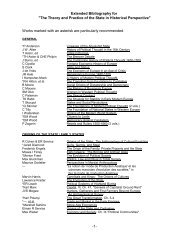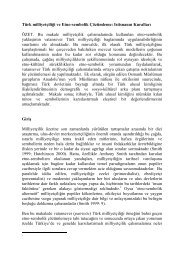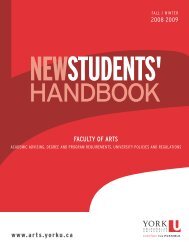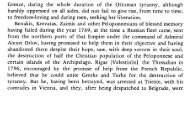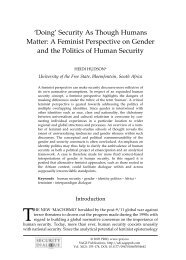The Greek diaspora in Eastern Europe and the Former Soviet Union
The Greek diaspora in Eastern Europe and the Former Soviet Union
The Greek diaspora in Eastern Europe and the Former Soviet Union
Create successful ePaper yourself
Turn your PDF publications into a flip-book with our unique Google optimized e-Paper software.
<strong>The</strong> third period started with <strong>the</strong> Gorbatchev’s accession<br />
to power <strong>and</strong> his reformatory attempts. All <strong>the</strong> measures<br />
that restricted ethnic m<strong>in</strong>orities were eased <strong>and</strong> many<br />
associations were founded. Unfortunately, <strong>the</strong> ethnic<br />
awaken<strong>in</strong>g that followed resulted <strong>in</strong> nationalistic disturbances<br />
<strong>and</strong> riots. In August 1989, <strong>the</strong> Central Committee of<br />
<strong>the</strong> Communist Party pronounced that <strong>the</strong> roots of those<br />
ethnic conflicts were to be found <strong>in</strong> <strong>the</strong> mass expulsions<br />
<strong>and</strong> persecution that had taken place dur<strong>in</strong>g <strong>the</strong> Stal<strong>in</strong>ist<br />
period <strong>and</strong>, as a solution, <strong>the</strong>y decided to guarantee <strong>the</strong><br />
rights of all ethnic m<strong>in</strong>orities <strong>and</strong> to help <strong>the</strong>m preserve<br />
<strong>the</strong>ir culture, language etc. <strong>The</strong> Committee went even fur<strong>the</strong>r<br />
to suggest autonomous status for those regions where<br />
<strong>the</strong>re was a significant articulation of ethnicity, which<br />
would have its representatives with<strong>in</strong> <strong>the</strong> decision-mak<strong>in</strong>g<br />
authorities. In 1991, <strong>the</strong> <strong>Soviet</strong> government proposed <strong>the</strong><br />
ma<strong>in</strong>tenance of <strong>the</strong> <strong>Soviet</strong> <strong>Union</strong> as a federation of <strong>in</strong>dependent<br />
<strong>and</strong> equivalent states, but six out of fifteen states<br />
refused by claim<strong>in</strong>g full <strong>in</strong>dependence from <strong>the</strong> <strong>Soviet</strong><br />
<strong>Union</strong>. Afterwards, <strong>the</strong> <strong>in</strong>tensity of <strong>the</strong> ethnic differences<br />
became highly acute <strong>and</strong> several conflicts erupted.<br />
Perestroika affected <strong>the</strong> Pontians <strong>in</strong> both a negative <strong>and</strong><br />
positive way. <strong>The</strong> positive effect was that <strong>the</strong>ir newspapers,<br />
along with many books, were published aga<strong>in</strong>, <strong>Greek</strong><br />
radio stations were established <strong>and</strong> <strong>the</strong> <strong>Greek</strong> language<br />
was taught at schools as a provisional choice or as a second<br />
language. In 1989 <strong>the</strong> <strong>Greek</strong> <strong>Union</strong>, Pontos, was founded<br />
under <strong>the</strong> leadership of A. Popof (<strong>the</strong> mayor of Moscow) as<br />
a central coord<strong>in</strong>at<strong>in</strong>g organ for all <strong>the</strong> local <strong>Greek</strong> unions.<br />
Pontos expressed <strong>the</strong> op<strong>in</strong>ion that only political autonomy<br />
would keep <strong>the</strong> <strong>Greek</strong>s liv<strong>in</strong>g <strong>in</strong> <strong>the</strong> <strong>Soviet</strong> <strong>Union</strong>, <strong>and</strong><br />
called for an autonomous, but not <strong>in</strong>dependent, district<br />
with<strong>in</strong> Russia (<strong>in</strong> south Russia) where <strong>the</strong> <strong>Greek</strong>s, who<br />
were spread all over <strong>the</strong> <strong>Soviet</strong> <strong>Union</strong>, should ga<strong>the</strong>r <strong>and</strong><br />
live peacefully.<br />
<strong>The</strong> negative effect of perestroika was <strong>the</strong> <strong>in</strong>crease <strong>in</strong><br />
nationalism, which was particularly acute <strong>in</strong> South Russia<br />
<strong>and</strong> <strong>the</strong> Crimea, both regions with large Pontian populations<br />
which opted for an autonomous Pontian district. <strong>The</strong><br />
rise <strong>in</strong> nationalism, coupled with riots <strong>and</strong> conflicts, was<br />
rem<strong>in</strong>iscent of <strong>the</strong> Stal<strong>in</strong>ist persecutions; <strong>the</strong> reaction was<br />
<strong>the</strong> emergence of a large Pontian emigration movement<br />
whose dest<strong>in</strong>ation was Greece. Thus, among <strong>the</strong>se two<br />
trends – <strong>the</strong> dem<strong>and</strong> for autonomy <strong>and</strong> <strong>the</strong> emigration to<br />
Greece – <strong>the</strong> second was much stronger. As a result, many<br />
Pontians f<strong>in</strong>ally emigrated to Greece. O<strong>the</strong>r reasons for<br />
this emigration were <strong>the</strong> preservation of <strong>the</strong> emigrants’<br />
national identity <strong>and</strong> language <strong>and</strong> <strong>the</strong> hope that <strong>the</strong>y, or<br />
at least <strong>the</strong>ir children, would no longer be oppressed, s<strong>in</strong>ce<br />
<strong>the</strong>y did not foresee any improvement <strong>in</strong> <strong>the</strong>ir situation <strong>in</strong><br />
<strong>the</strong> (former) <strong>Soviet</strong> <strong>Union</strong>. It is important to mention at this<br />
po<strong>in</strong>t that <strong>the</strong> Pontians had never had any particular desire<br />
to emigrate to Greece, for <strong>the</strong>y had never lived <strong>the</strong>re, but<br />
still <strong>the</strong>y considered it to be <strong>the</strong>ir national centre <strong>and</strong> it<br />
held an emotional importance for <strong>the</strong>m.<br />
Some statistical <strong>in</strong>formation is necessary here. It is estimated<br />
that 700,000 Pontians were liv<strong>in</strong>g <strong>in</strong> <strong>Soviet</strong> <strong>Union</strong><br />
after 1918–1920; this number can be considered an accurate<br />
one, although <strong>the</strong>re is no official <strong>in</strong>formation available.<br />
<strong>The</strong>re are some official statistics from <strong>the</strong> censuses<br />
conducted by <strong>the</strong> <strong>Soviet</strong> government...<br />
Please refer to our forthcom<strong>in</strong>g publication “Migration <strong>and</strong> Political<br />
Intervention. Diasporas <strong>in</strong> Transition Countries” for <strong>the</strong><br />
complete text.<br />
10 11


